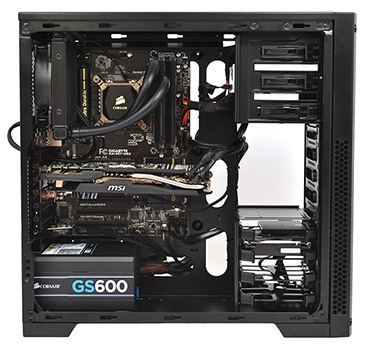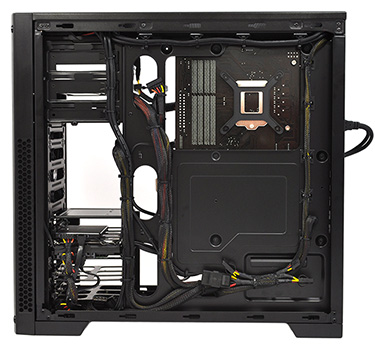3XS Haswell Makeover
System integrators must be hoping that Intel has an enthusiast-orientated Haswell-E platform somewhere on the roadmap. You know, a 150W chip with six hyper-threaded cores, no integrated graphics and the ability to overclock like the clappers. Such a processor would enable SIs to build benchmark-shattering rigs that fetch maximum profits from deep-pocketed gamers.
Instead, we have regular Haswell - aka the fourth-generation Core processor family - whose primary focus is to bring increased efficiency to mobile PCs. This leaves high-end system integrators facing a challenge, and as we found out in our review of the Vanquish R4, putting together a fourth-generation Intel gaming system that's far superior to last-generation equivalents is going to be easier said than done.
Scan Computers is never one to shy away from a challenge, so we've been looking forward to seeing how the popular 3XS range would assimilate and flaunt the very latest Intel silicon.
Fresh off the production line, the Bolton outfit has sent in the 3XS Z87 Performance GTX for evaluation. Priced at £1,200 in its default configuration, the high-performance rig is a direct replacement for the Sandy Bridge and Ivy Bridge variants of years gone by.
As was the case with previous models, Scan's attempt to strike an optimum balance between price and performance has led the company to skip right past the top-of-the-line Core i7 chips and settle on the best of the Core i5 bunch, the four-core, four-thread 4670K.
It seems this 3.4GHz part is going to be the chip of choice for system integrators putting together gaming-orientated builds, but how much of an overclock we're likely to see remains something of a question mark. Our own Haswell frequency shenanigans delivered mixed results, making us wonder how far the likes of Scan would be willing to push their warranty-covered machines.
We've seen one SI play it safe and ship the Core i5-4670K at 4.2GHz, but Scan's engineers are feeling more adventurous and have the 3XS Z87 Performance GTX ramped up higher to 4.4GHz. The fact that a 44x multiplier almost feels like dangerous territory tells you everything you need to know about our faith in Haswell's overclockability, and Scan's recent history provides an interesting metric in itself.
The Performance GTX system shipped with a Core i5-2500K overclocked to 4.7GHz during the Sandy Bridge era, and a Core i5-3570K was bumped up to 4.6GHz for last year's Ivy Bridge. And both those machines used air cooling. This time around, Scan has employed a Corsair Hydro H60 liquid cooler to help keep the fourth-gen Intel chip running as comfortable as possible.
Making the most of recent product launches, graphics are provided by Nvidia's GeForce GTX 770 - which, as you know, is ultimately a faster variant of last year's GTX 680 - and it all sits atop of an LGA1150-supporting Gigabyte GA-Z87-HD3 motherboard.
Scan, as always, has a wide range of configuration options available, though we suspect most consumers will find little need to stray from the default specification. This includes 8GB of Corsair Vengeance LP memory, a 250GB Samsung 840 Series SSD, a 2TB Seagate Barracuda hard disk, a Samsung DVD Writer, a dedicated Asus Xonar DGX sound card and a 600W Corsair GS-Series power supply all wrapped inside a Corsair Carbide Series 300R Windowed chassis.
It's a tasty coming together of components, though there may be cause for a tweak or two. Would-be buyers should note that the default Gigabyte GA-Z87-HD3 motherboard doesn't offer SLI support - if you're planning on adding a second GTX 770 further down the road, consider upgrading to the GA-Z87X-D3H for an extra £20 or so.
Whichever board you choose, you're likely to appreciate Scan's build quality. We see our fair share of high-end gaming PCs, yet the 3XS range never fails to impress through tidiness and attention to detail. Despite shipping without a modular PSU, cable management is excellent and there are plenty of finer details that won't escape your attention.
In addition to overclocking the CPU, Scan also throws in a free GPU overclock by increasing the MSI GTX 770 Gaming's base frequency to 1,159MHz (up from 1,098MHz) and the 2GB frame buffer to an effective 7,812MHz (up from 7,010MHz).
Elsewhere, the Gigabyte motherboard BIOS is configured to run all attached fans in a silent profile to help keep down noise levels, the clean install of Windows 8 is updated with all the latest drivers, and the Corsair chassis has been spruced up, too. An NZXT sleeved white LED lighting kit surrounds the trim of the windowed side panel and provides an attractive glow (don't worry, it's easily disabled via a rear switch) and a Scan 3XS memory card reader installed in the first 5.25in drive bay routes a further two USB 3.0 ports to the front of the chassis, in addition to providing multi-card support and a backlit Scan 3XS logo.
Looks rather good, doesn't it? Pricing up the individual components suggests that it would cost roughly £1,195 to buy the parts from Scan and build the system yourself, so in this case buying built makes implicit sense; the 3XS configuration gives you guaranteed CPU and GPU overclocks and the peace of mind of a three-year warranty.
Question is, do the new Intel and Nvidia components do enough to raise performance over previous generations, and what sort of impact does Scan's overclock have on power consumption, temperature and noise? Let's find out.














